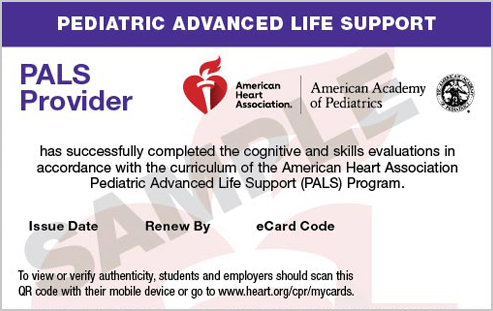Understanding PALS Renewal
Prime CPR Services teaches the American Heart Association (AHA) PALS RENEWAL (Pediatric Advanced Life Support) renewal class is intended for healthcare professionals who have previously completed the full PALS course and need to refresh and renew their certification. This class is focused on equipping healthcare providers with the necessary skills to handle critical situations involving infants and children. Eligible participants may include doctors, nurses, nurse practitioners, paramedics, EMTs, respiratory therapists, physician assistants, medical and nursing students, and other allied healthcare professionals who regularly care for pediatric patients.

If you need a PALS book, we will ship it priority, so you will receive it well in advance of your scheduled class. You may also consider alternative book options by getting a PALS ebook by clicking HERE
PALS RENEWAL covers:
-
Pediatric Assessment: Systematically assess pediatric patients, identify potential life-threatening conditions, and prioritize interventions based on the child's condition.
-
Basic Life Support (BLS) Skills: The course covers high-quality CPR (Cardiopulmonary Resuscitation) for infants, children, and adults, including chest compressions, rescue breaths, and the use of an Automated External Defibrillator (AED).
-
Pediatric Algorithms: Participants are taught PALS-specific algorithms and flowcharts for managing various pediatric emergencies, such as respiratory distress, respiratory failure, bradycardia, tachycardia, and cardiac arrest.
-
Respiratory Emergencies: The class covers the recognition and management of respiratory distress, respiratory failure, and respiratory arrest in pediatric patients.
-
Cardiac Arrest Management: Participants learn the steps to manage cardiac arrest in infants and children, including the use of appropriate medications, defibrillation, and advanced airway management.
-
Vascular Access: Techniques for obtaining vascular access in pediatric patients are taught, including intraosseous (IO) access and peripheral intravenous (IV) access.
-
Pharmacology: The course covers the indications, dosages, and administration of medications used during pediatric resuscitation, such as epinephrine, amiodarone, and atropine.
-
Bradycardia and Tachycardia Management: Participants learn to identify and manage various heart rhythms associated with bradycardia and tachycardia in pediatric patients.
-
Post-Cardiac Arrest Care: The class covers critical care following successful resuscitation, including post-cardiac arrest interventions and targeted temperature management.
- Team Dynamics: Effective communication and teamwork during pediatric emergencies are emphasized to ensure efficient and coordinated care.
Free to call, text or email us if you have any questions or concerns.
Importance of PALS Renewal
PALS renewal is essential for healthcare providers who want to maintain their skills in pediatric advanced life support. Every few years, practitioners are required to update their certifications to ensure they are familiar with the latest guidelines and practices. This helps not only in providing better patient care but also enhances overall confidence when responding to emergencies. Staying current is crucial because, during critical situations, every second counts between life and death.
Course Structure and Benefits
The PALS renewal course typically includes hands-on practice, lectures, and skills testing. Participants will engage in simulations that mimic real-life scenarios, allowing them to apply what they’ve learned in a controlled environment. By the end of the course, healthcare professionals will not only renew their PALS certifications but also gain valuable insights into new techniques and protocols. This comprehensive approach is designed to ensure that participants leave feeling well-prepared for any situation.
Who Should Consider PALS Renewal?
Professionals who work in pediatric care, such as nurses, paramedics, and physicians, should consider PALS renewal training. However, it is also beneficial for anyone involved in emergency medical response, as familiarizing oneself with pediatric care can enhance team effectiveness. Because pediatric emergencies are often unique, understanding the specific requirements for infants and children can significantly impact patient outcomes. Thus, enrolling in a PALS renewal course is a wise investment in your professional development.



